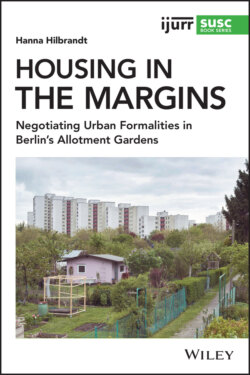Читать книгу Housing in the Margins - Hanna Hilbrandt - Страница 15
Chapter 2 Negotiating Formalities Informality and the Everyday State
ОглавлениеThis chapter unpicks the relation between informality and the state. The thesis that guides this inquiry is that explicating the ontological assumptions about the state that undergird conceptions of informality can explain some of the limits of the latter concept for an analysis of housing in Berlin’s allotments. My related proposition is that specifying these assumptions can help to better grasp and qualify informality’s utility in an analysis of state enactment and urban governance. The chapter thus explores the implications of understanding informality through the particular aspect of the state I work with in this book, where the focus lies on how everyday actors negotiate the implementation of regulations in the urban everyday.
The relation of informality to the state has been understood in widely varying ways that are clearly shaped by different ontologies of the state. These underpinnings have rarely been made explicit in research on informality. Yet the ways in which informality is researched and defined are conditioned by how the analytical relations between imaginaries of informality and the state are cast. While informality has long been described as the “other” of states, twenty-first-century scholarship has seen a new generation of urban research advance critical investigations into the multiple interrelations between both concepts, offering more differentiated accounts of the role of the state in the production of urban exclusion. This work has discussed informality as a tool of governance, a negotiable value, a form of state speculation, a means of enacting citizenship, and a mode of resistance (Roy, 2005; Yiftachel, 2009a; Goldman, 2011; Davis, 2018). These perspectives have proven critical in flagging up the forms of exclusion driven by the state, the arbitrary exercise of political power, and the consequential insecurities that those inhabiting irregular housing are prone to face. However, these conceptions do not travel well into Berlin’s allotment gardens. More generally put, they pose difficulties for operationalizing the ways in which everyday transgressions are accommodated in the institutional work of relatively functioning regulatory processes. My objective is thus not to argue against these diverse approaches. Rather, I aim to extend these debates, grappling with their existing boundaries by analyzing processes that lie beyond their current attention.
Explaining how informality works within or parallel to bureaucracies that are largely accountable, present, and capable requires a more “intimate” analysis of regulatory processes at the level of everyday implementation. Thus, in order to understand the negotiation of transgression and regulation, I take my cue from perspectives on state enactment that stress its agentic, situated, and relational dimensions. Such perspectives examine the state up-close in order to better comprehend the agency of all parties concerned, foster an understanding of their negotiations from a situated perspective, and analyze how these practices relationally shape and are shaped by how state and urban governance become enacted.
My argument is that this reading of how people negotiate irregular housing conditions in everyday situations is not only more in tune with the ways in which informality is governed in Berlin’s allotment gardens than accounts of informality that focus on “states ‘with muscles’” are (Boudreau et al., 2016: 2397), but permits us to grasp the normalcy of these negotiations as well. The explanatory promise of a focus on these “quieter registers of power” (Allen, 2016: 11) is that it pinpoints modalities of inclusion and exclusion that play out at the everyday scale. Such an analysis not only shows what is up for negotiation and the degree of latitude that is tolerated, but also demonstrates the small-scale mechanisms through which power relations work to privilege certain practices and declare others as untypical. In this reading, informality becomes a lens to view the everyday production and reproduction of urban inequalities. Translating the concept in this way may allow us to overcome assumptions of unbridgeable differences between Northern and Southern states. Moreover, it moves us beyond the confines of informality research on the global South, the poor, and the agency of a predatory state.
This chapter continues in three parts. First, a review of informality scholarship serves to explicate the approaches to the state and urban governance that undergird this work. In the next section, my aim to think of informality “differently” involves the mobilization of a repertoire of conceptual angles that deal especially with state enactment at the everyday level of urban regulation. The final section concludes by exploring possible conceptual gains of this perspective for an understanding of urban informality and the negotiation of regulations in the urban everyday.
